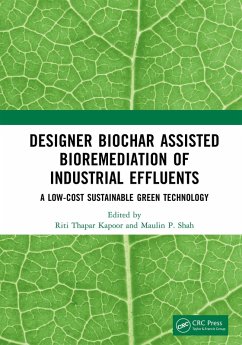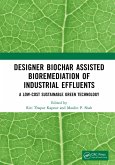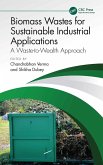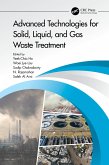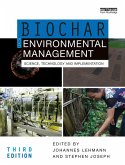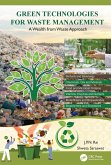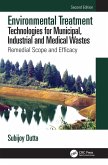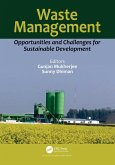Designer Biochar Assisted Bioremediation of Industrial Effluents (eBook, PDF)
A Low-Cost Sustainable Green Technology
Redaktion: Kapoor, Riti Thapar; Shah, Maulin P.
51,95 €
51,95 €
inkl. MwSt.
Sofort per Download lieferbar

26 °P sammeln
51,95 €
Als Download kaufen

51,95 €
inkl. MwSt.
Sofort per Download lieferbar

26 °P sammeln
Jetzt verschenken
Alle Infos zum eBook verschenken
51,95 €
inkl. MwSt.
Sofort per Download lieferbar
Alle Infos zum eBook verschenken

26 °P sammeln
Designer Biochar Assisted Bioremediation of Industrial Effluents (eBook, PDF)
A Low-Cost Sustainable Green Technology
Redaktion: Kapoor, Riti Thapar; Shah, Maulin P.
- Format: PDF
- Merkliste
- Auf die Merkliste
- Bewerten Bewerten
- Teilen
- Produkt teilen
- Produkterinnerung
- Produkterinnerung

Bitte loggen Sie sich zunächst in Ihr Kundenkonto ein oder registrieren Sie sich bei
bücher.de, um das eBook-Abo tolino select nutzen zu können.
Hier können Sie sich einloggen
Hier können Sie sich einloggen
Sie sind bereits eingeloggt. Klicken Sie auf 2. tolino select Abo, um fortzufahren.

Bitte loggen Sie sich zunächst in Ihr Kundenkonto ein oder registrieren Sie sich bei bücher.de, um das eBook-Abo tolino select nutzen zu können.
This book provides useful information and applications of biochar produced from agricultural waste, for removal of contaminants from industrial effluent and reutilization of waste sludge in production of biofuel/bioenergy. It deals with the unique features, advantages and disadvantages of techniques for biochar production and analyses.
- Geräte: PC
- ohne Kopierschutz
- eBook Hilfe
- Größe: 6.57MB
Andere Kunden interessierten sich auch für
![Designer Biochar Assisted Bioremediation of Industrial Effluents (eBook, ePUB) Designer Biochar Assisted Bioremediation of Industrial Effluents (eBook, ePUB)]() Designer Biochar Assisted Bioremediation of Industrial Effluents (eBook, ePUB)51,95 €
Designer Biochar Assisted Bioremediation of Industrial Effluents (eBook, ePUB)51,95 €![Biomass Wastes for Sustainable Industrial Applications (eBook, PDF) Biomass Wastes for Sustainable Industrial Applications (eBook, PDF)]() Biomass Wastes for Sustainable Industrial Applications (eBook, PDF)54,95 €
Biomass Wastes for Sustainable Industrial Applications (eBook, PDF)54,95 €![Advanced Technologies for Solid, Liquid, and Gas Waste Treatment (eBook, PDF) Advanced Technologies for Solid, Liquid, and Gas Waste Treatment (eBook, PDF)]() Advanced Technologies for Solid, Liquid, and Gas Waste Treatment (eBook, PDF)51,95 €
Advanced Technologies for Solid, Liquid, and Gas Waste Treatment (eBook, PDF)51,95 €![Biochar for Environmental Management (eBook, PDF) Biochar for Environmental Management (eBook, PDF)]() Biochar for Environmental Management (eBook, PDF)86,95 €
Biochar for Environmental Management (eBook, PDF)86,95 €![Green Technologies for Waste Management (eBook, PDF) Green Technologies for Waste Management (eBook, PDF)]() J. P. N. RaiGreen Technologies for Waste Management (eBook, PDF)121,95 €
J. P. N. RaiGreen Technologies for Waste Management (eBook, PDF)121,95 €![Environmental Treatment Technologies for Municipal, Industrial and Medical Wastes (eBook, PDF) Environmental Treatment Technologies for Municipal, Industrial and Medical Wastes (eBook, PDF)]() Subijoy DuttaEnvironmental Treatment Technologies for Municipal, Industrial and Medical Wastes (eBook, PDF)50,95 €
Subijoy DuttaEnvironmental Treatment Technologies for Municipal, Industrial and Medical Wastes (eBook, PDF)50,95 €![Waste Management (eBook, PDF) Waste Management (eBook, PDF)]() Waste Management (eBook, PDF)68,95 €
Waste Management (eBook, PDF)68,95 €-
-
-
This book provides useful information and applications of biochar produced from agricultural waste, for removal of contaminants from industrial effluent and reutilization of waste sludge in production of biofuel/bioenergy. It deals with the unique features, advantages and disadvantages of techniques for biochar production and analyses.
Dieser Download kann aus rechtlichen Gründen nur mit Rechnungsadresse in A, B, BG, CY, CZ, D, DK, EW, E, FIN, F, GR, HR, H, IRL, I, LT, L, LR, M, NL, PL, P, R, S, SLO, SK ausgeliefert werden.
Produktdetails
- Produktdetails
- Verlag: Taylor & Francis eBooks
- Seitenzahl: 324
- Erscheinungstermin: 12. Dezember 2022
- Englisch
- ISBN-13: 9781000791150
- Artikelnr.: 65997410
- Verlag: Taylor & Francis eBooks
- Seitenzahl: 324
- Erscheinungstermin: 12. Dezember 2022
- Englisch
- ISBN-13: 9781000791150
- Artikelnr.: 65997410
- Herstellerkennzeichnung Die Herstellerinformationen sind derzeit nicht verfügbar.
Riti Thapar Kapoor is Assistant Professor (Grade-III) in Amity Institute of Biotechnology, Amity University Uttar Pradesh, Noida, India. Dr. Kapoor received her PhD from the University of Allahabad and worked as postdoctoral fellow at Banaras Hindu University, Varanasi, India. Dr. Kapoor has 14 years of teaching and research experience, and her area of specialization is environmental biotechnology, bioremediation, and abiotic stresses. Dr. Kapoor is author of three books and editor of five books of international repute (Elsevier, Springer, DeGruyter, etc.). She has published over 80 research papers in various journals of national and international repute. Dr. Kapoor has visited eight countries for participation in different academic programs. Dr. Kapoor has received a prestigious travel award from Bill & Melinda Gates Research Foundation (CGIAR project) for participation in an international training program held at International Rice Research Institute (IRRI), Manila, Philippines in 2010. She is also recipient of a DST travel grant for participation in an International Conference held at Sri Lanka in 2013. Dr. Kapoor has been awarded a Teacher's Research Fellowship from the Indian Academy of Sciences, Bengaluru, in 2019. Maulin P. Shah is an active researcher and scientific writer in his field for over 20 years. He received a BSc degree (1999) in Microbiology from Gujarat University, Godhra (Gujarat), India. He also earned his PhD degree (2005) in Environmental Microbiology from Sardar Patel University, Vallabh Vidyanagar (Gujarat), India. His research interests include Biological Wastewater Treatment, Environmental Microbiology, Biodegradation, Bioremediation, and Phytoremediation of Environmental Pollutants from Industrial Wastewaters. He has published more than 250 research papers in national and international journals of repute on various aspects of microbial biodegradation and bioremediation of environmental pollutants. He is the editor of 90 books of international repute (RSC, Elsevier, Springer, DeGruyter, Wiley, and CRC Press).
1 Recent Advances in Biochar Production and Its Applications toward Textile
Industry Effluent Treatment; 2 Utilization of Modified Biochar for
Wastewater Recycling and Management: An Overview; 3 Removal of Emerging
Contaminants by Biochar: An Eco-friendly Approach for a Sustainable
Environment; 4 Biochar for the Remediation of Heavy-Metal-Contaminated
Soil: Present Scenario and Future Challenges; 5 Review on Biochar
Production from Biomass and Its Applications in Removing Environmental
Pollutants; 6 Modified Biochar for Wastewater Treatment and Reuse; 7
Utilization of Sustainable Biochar Approach to Improve Contaminated
Agricultural Soils for Plant Growth Promotion; 8 Prospects of Biochar
Technology for Clean Water Provision; 9 Biochar for Removal of Dyes from
Industrial Effluents; 10 Efficacy of Biochar in Decontamination of
Pesticides; 11 Application of Biochar in the Removal of Organic and
Inorganic Contaminants from Wastewater: Mechanism, Operating Conditions,
and Modifications; 12 Removal of Pharmaceutical Active Compounds (PhACs)
from Wastewater by Designer Biochar; 13 Recent Advances in Dye Removal
Technologies by Designer Biochar; 14 Restoration of Contaminated
Agricultural Soils Using Modified Biochar; 15 Use of Biochar for the
Remediation of Heavy-Metal-Contaminated Soil; 16 Treatment of Industrial
Wastewater by Utilization of Biochar as a Green Technology; 17 Biochar
Application for Treatment of Industrial Effluent as a Green Technology:
Opportunities, Challenges, and Future Perspectives
Industry Effluent Treatment; 2 Utilization of Modified Biochar for
Wastewater Recycling and Management: An Overview; 3 Removal of Emerging
Contaminants by Biochar: An Eco-friendly Approach for a Sustainable
Environment; 4 Biochar for the Remediation of Heavy-Metal-Contaminated
Soil: Present Scenario and Future Challenges; 5 Review on Biochar
Production from Biomass and Its Applications in Removing Environmental
Pollutants; 6 Modified Biochar for Wastewater Treatment and Reuse; 7
Utilization of Sustainable Biochar Approach to Improve Contaminated
Agricultural Soils for Plant Growth Promotion; 8 Prospects of Biochar
Technology for Clean Water Provision; 9 Biochar for Removal of Dyes from
Industrial Effluents; 10 Efficacy of Biochar in Decontamination of
Pesticides; 11 Application of Biochar in the Removal of Organic and
Inorganic Contaminants from Wastewater: Mechanism, Operating Conditions,
and Modifications; 12 Removal of Pharmaceutical Active Compounds (PhACs)
from Wastewater by Designer Biochar; 13 Recent Advances in Dye Removal
Technologies by Designer Biochar; 14 Restoration of Contaminated
Agricultural Soils Using Modified Biochar; 15 Use of Biochar for the
Remediation of Heavy-Metal-Contaminated Soil; 16 Treatment of Industrial
Wastewater by Utilization of Biochar as a Green Technology; 17 Biochar
Application for Treatment of Industrial Effluent as a Green Technology:
Opportunities, Challenges, and Future Perspectives
1 Recent Advances in Biochar Production and Its Applications toward Textile
Industry Effluent Treatment; 2 Utilization of Modified Biochar for
Wastewater Recycling and Management: An Overview; 3 Removal of Emerging
Contaminants by Biochar: An Eco-friendly Approach for a Sustainable
Environment; 4 Biochar for the Remediation of Heavy-Metal-Contaminated
Soil: Present Scenario and Future Challenges; 5 Review on Biochar
Production from Biomass and Its Applications in Removing Environmental
Pollutants; 6 Modified Biochar for Wastewater Treatment and Reuse; 7
Utilization of Sustainable Biochar Approach to Improve Contaminated
Agricultural Soils for Plant Growth Promotion; 8 Prospects of Biochar
Technology for Clean Water Provision; 9 Biochar for Removal of Dyes from
Industrial Effluents; 10 Efficacy of Biochar in Decontamination of
Pesticides; 11 Application of Biochar in the Removal of Organic and
Inorganic Contaminants from Wastewater: Mechanism, Operating Conditions,
and Modifications; 12 Removal of Pharmaceutical Active Compounds (PhACs)
from Wastewater by Designer Biochar; 13 Recent Advances in Dye Removal
Technologies by Designer Biochar; 14 Restoration of Contaminated
Agricultural Soils Using Modified Biochar; 15 Use of Biochar for the
Remediation of Heavy-Metal-Contaminated Soil; 16 Treatment of Industrial
Wastewater by Utilization of Biochar as a Green Technology; 17 Biochar
Application for Treatment of Industrial Effluent as a Green Technology:
Opportunities, Challenges, and Future Perspectives
Industry Effluent Treatment; 2 Utilization of Modified Biochar for
Wastewater Recycling and Management: An Overview; 3 Removal of Emerging
Contaminants by Biochar: An Eco-friendly Approach for a Sustainable
Environment; 4 Biochar for the Remediation of Heavy-Metal-Contaminated
Soil: Present Scenario and Future Challenges; 5 Review on Biochar
Production from Biomass and Its Applications in Removing Environmental
Pollutants; 6 Modified Biochar for Wastewater Treatment and Reuse; 7
Utilization of Sustainable Biochar Approach to Improve Contaminated
Agricultural Soils for Plant Growth Promotion; 8 Prospects of Biochar
Technology for Clean Water Provision; 9 Biochar for Removal of Dyes from
Industrial Effluents; 10 Efficacy of Biochar in Decontamination of
Pesticides; 11 Application of Biochar in the Removal of Organic and
Inorganic Contaminants from Wastewater: Mechanism, Operating Conditions,
and Modifications; 12 Removal of Pharmaceutical Active Compounds (PhACs)
from Wastewater by Designer Biochar; 13 Recent Advances in Dye Removal
Technologies by Designer Biochar; 14 Restoration of Contaminated
Agricultural Soils Using Modified Biochar; 15 Use of Biochar for the
Remediation of Heavy-Metal-Contaminated Soil; 16 Treatment of Industrial
Wastewater by Utilization of Biochar as a Green Technology; 17 Biochar
Application for Treatment of Industrial Effluent as a Green Technology:
Opportunities, Challenges, and Future Perspectives
